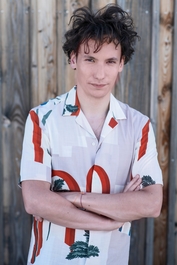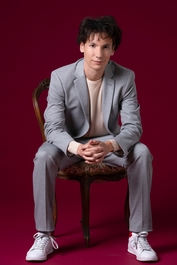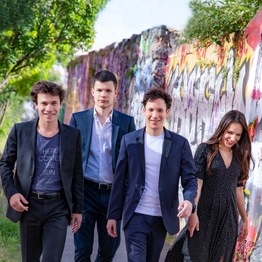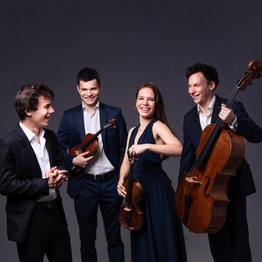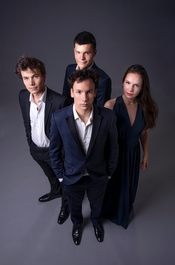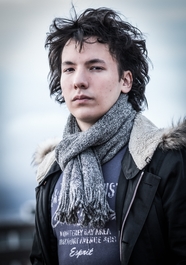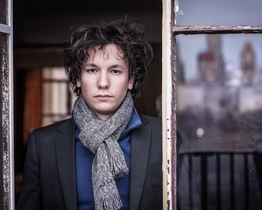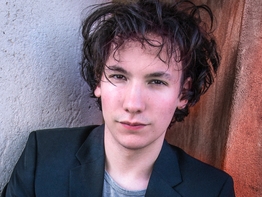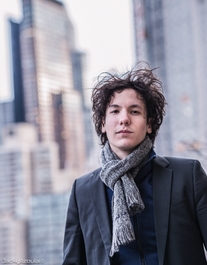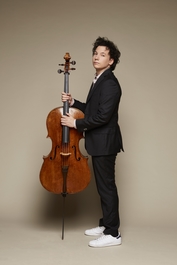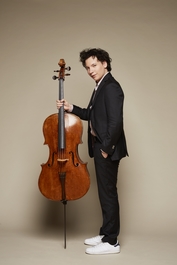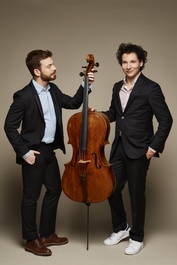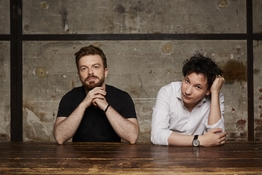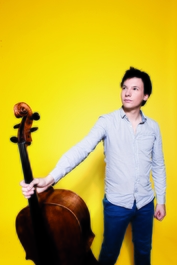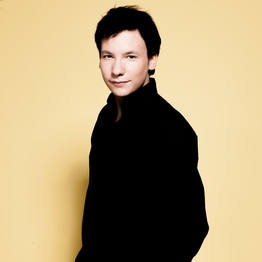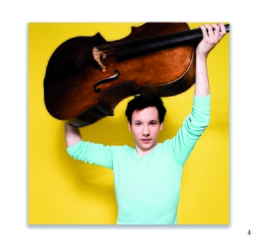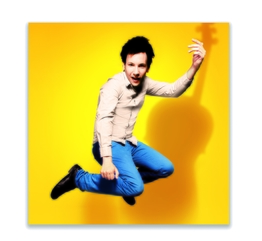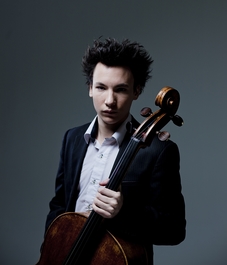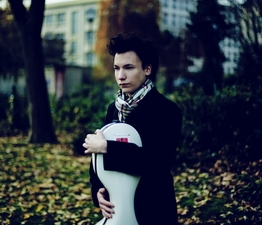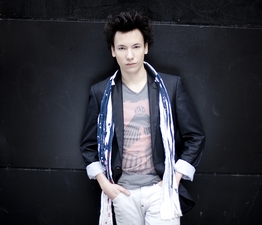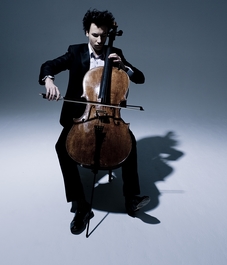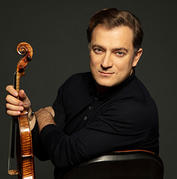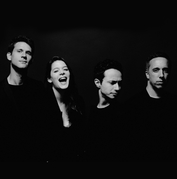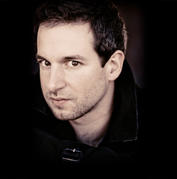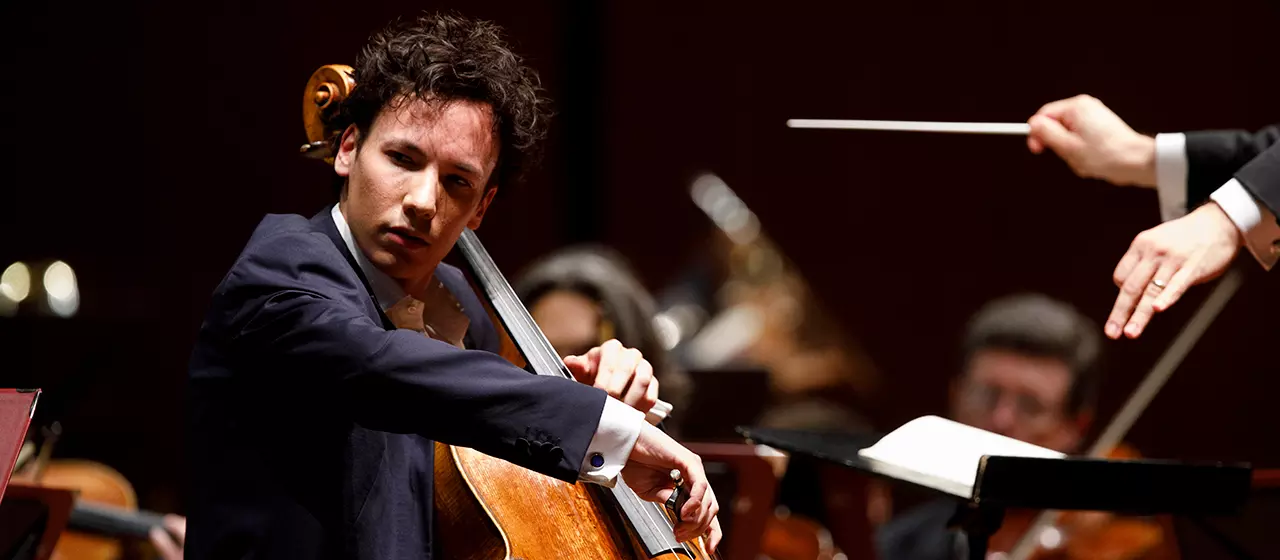

Edgar Moreau
News
Eric Tanguy: In a Dream - Chamber Music
“Imagination, poetry and an interior world are important to me in my work,” says Eric Tanguy, a composer whose captivating music is performed widely in his native France and around the world.
Born in 1968, Tanguy has produced a wide-ranging catalogue of some 100 works. The album In a Dream takes its title from a piece for violin and piano, one of the eight chamber works on its programme. Composed over a period of 20 years (1999-2019), they are performed here by violinists Alexandra Conunova and Rosanne Philippens, viola-player Lise Berthaud, cellist Edgar Moreau, clarinettist Pierre Génisson, pianists Suzana Bartal and David Kadouch, and string ensemble Quatuor Diotima. The titles that Tanguy gives his pieces are suggestively poetic rather than programmatic, but In a Dream also includes Spirales, Nachtmusik and Lacrymosa in addition to the more literal ‘Quintette’, ‘Rhapsodie’ and ‘Trio’.
Tanguy, himself an experienced violinist, studied at the Conservatoire National Supérieur de Musique in Paris. He emphasises that he does not identify with any specific ‘school' of composition, such as spectralism, minimalism or serialism. Through Henri Dutilleux, who numbers amongst his mentors, he is in the line of French composers that runs from Debussy through Messiaen, but the great Finn Sibelius is another composer who holds a special place in his heart and aesthetic.
A distinguishing feature of Tanguy’s music is his use of families of modes, which, as he explains, are scales that can be traced back to antiquity and which characterise music of diverse cultures around the world. “They open up so many possibilities,” he says. “The permutations of intervals create a very particular colour and expressivity as you pass from one mode to another. There is rigour and purpose behind my music, but I don’t expect the listener to have to decode it… It’s the feeling that matters... I want listeners to bathe in the sonorities I present to them”.
“What is really fantastic is hearing performances by someone who has understood your music,” he continues. “This is the magical thing in an artistic collaboration – when you have a performer who is so involved and who brings out a lot in your music – that is the biggest joy to me.”
The French magazine Le Monde de la Musique described Tanguy – twice the winner of France’s Victoires de la musique classique award – as “one of today’s most engaging composers of serious music. His work is richly imaginative, superbly constructed and accessible to a wide audience.” The writer went on to praise Tanguy’s capacity for combining sensory appeal with dramatic tension, an observation echoed by the New York Times when reporting on an orchestral score that “quivers with exuberance and intoxication”. The distinguished Finnish composer Kaija Saariaho, whose work Tanguy especially admires, has described him as “one of the major composers of our time”.
Eric Tanguy, now a professor of composition at two conservatories in Paris, studied with Horatiu Radulescu, Ivo Malec, Gérard Grisey, and Betsy Jolas and went on to win number of French and German prizes. He has been a composer-in-residence in France, Italy, Finland, the UK and the US (Tanglewood Music Center). His catalogue ranges from solo pieces and chamber music to concertos, vocal works and symphonies, and his music has been performed by such instrumentalists as Mstislav Rostropovich (who in 2001 premiered his Cello Concerto No 2), Piotr Anderszewski, Nicholas Angelich, Renaud Capuçon, Gautier Capuçon, Edgar Moreau and Emmanuel Pahud, and conducted by, among others, Semyon Bychkov, Seiji Ozawa, Michel Plasson, François-Xavier Roth and Esa-Pekka Salonen. Ensembles and orchestras that have played his works include the Arod, Arditti and Ysaÿe quartets, the Trio Wanderer, the Ensemble Intercontemporain, London Sinfonietta, Orchestre National de France, Orchestre de Paris, Orchestre Philharmonique de Radio- France, Boston Symphony Orchestra, Los Angeles Philharmonic, Helsinki Philharmonic, BBC National Orchestra of Wales, Scottish Chamber Orchestra, Tonhalle Orchestra and Sinfonia Varsovia.
Michael Sanderling and the Lucerne Symphony Orchestra join Edgar Moreau on his upcoming album
With Transmission – music by Bloch, Korngold, Bruch and Ravel, recorded with the Lucerne Symphony Orchestra and conductor Michael Sanderling – the French cellist Edgar Moreau salutes his family heritage and highlights some landmarks in his artistic development.
Moreau’s mother is of Polish-Jewish extraction and all five works on the album have a connection with Jewish culture. Three of them are by Jewish composers: From Jewish Life and Schelomo (Solomon) by the Geneva-born Ernest Bloch, and the cello concerto by Erich Korngold, written in 1946, some eight years after the composer, on a working visit to Hollywood, suddenly became an exile from Austria on its annexation by the Nazis. They are complemented by Max Bruch’s Kol Nidrei (All Vows), inspired by the prayer that each year inaugurates the solemn festival of Yom Kippur, the Day of Atonement, and by instrumental versions of Maurice Ravel’s Deux mélodies hébraïques; the first of these is a powerful setting of the liturgical prayer for mourners and the second is a quizzical ditty in Yiddish.
Moreau has been described by BBC Music Magazine as “a cellist of exceptional gifts with a vibrant directness of delivery, absolute security of tone and intonation in all registers and a concentrated intentness in his playing that rivets the attention”. His relationship with the Lucerne Symphony Orchestra goes back to the beginnings of his still young career – he turned 27 this year – and it is now six years since the Swiss ensemble awarded him the Arthur-Waser-Förderpreis (Arthur Waser Award) in association with a Lucerne-based philanthropic foundation. Michael Sanderling, himself a cellist, became the orchestra’s Chief Conductor at the beginning of the 2021-22 season; his father, the distinguished conductor Kurt Sanderling (1912-2011), was one of the many Jewish artists who were forced to leave their native Germany in the 1930s.
Kol Nidrei is a piece that Edgar Moreau first played at the age of eight or nine (“I was quite ahead in my development,” he says). Schelomo followed when he was 12 or so, and he describes it as “a majestic meeting of concerto and symphony, rich and colourful in its orchestration and full of contrasts”. He took the works by Ravel and Korngold into his repertoire in his late teens and early twenties. Korngold, of course, is a towering figure in the history of film music, and the cello concerto has its origins in a six-minute piece played by one of the characters in the film Deception, an overheated drama starring Bette Davis as a pianist, Paul Heinreid as a cellist and Claude Rains as a composer.
Edgar Moreau invites his siblings to present A Family Affair this Autumn
The young French cellist Edgar Moreau has built quite a reputation since the release in 2014 of his first Erato album, PLAY, recorded when he was still a teenager. He is not, however, the only exceptional musician in his family. For this programme of music by Dvořák and Korngold, he is joined by his violinist sister Raphaëlle (who, among other achievements, is concertmaster of the prestigious Gustav Mahler Jugendorchester), his brother David, also a violinist, and his pianist brother Jérémie, who explains that: “Our parents were music lovers and our mother turned us all onto music at an early age. Later we all chose to devote ourselves to it.”
The main body of the album is formed by Antonín Dvořák’s five Bagatelles op 47 for two violins, cello and piano, composed in the late 1870s, and Erich Wolfgang Korngold’s Suite op 23 for the same combination of instruments, though the piano part is written for the left hand only. At its premiere in 1930, the pianist was the suite’s dedicatee, Paul Wittgenstein, who, having lost his right hand in World War 1, commissioned music from a number of major composers. The Moreau siblings are accustomed to playing together in works for two or three instruments, but, as David points out, “Two violins, piano and cello is an unusual combination. These are wonderful pieces that are rarely played, so this is an opportunity to shine a spotlight on them.”
“It’s extraordinary to play music as a family,” says Edgar, “There’s something that works in an almost instinctive way, that allows us to move forward very quickly.” Raphaëlle agrees: “There’s a naturalness – we don’t need to look at each other, and we breathe together in a certain way. There’s something very strong about it.”
It happens that both composers were born in what is now the Czech Republic: Dvořák near Prague in 1841; Korngold in Brno (then known as Brünn) in 1897, though it was Vienna that became his home and the setting for his rise to fame as a child prodigy. Edgar Moreau points out another connection between the two composers: they both left Central Europe to make their lives in America: Dvořák for just three years in the 1890s, when he was director of the National Conservatory of Music in New York; Korngold in the 1930s, when he was composing sumptuous film scores for Hollywood and was forced into long-term exile by Germany’s annexation of Austria in 1938.
The album is completed by arrangements for cello and piano of two celebrated arias – each from the composer’s most famous opera. Edgar and Jérémie perform the ‘Song to the Moon’ ('Měsíčku na nebi hlubokém') from Act 1 of Dvořák’s Rusalka (first performed in 1901) and Marietta’s Song (‘Glück, das mir verblieb’) from Act 1 of Korngold’s Die tote Stadt (premiered in 1920). Both are reflective and lyrical: the first is the plea of a water sprite who has fallen in love with a human prince; the second is sung by Marietta, a vivacious dancer, to Paul, a bereft widower. Marietta appears to be a reincarnation of his dead wife, Marie, and in the opera her ‘Lute Song’ becomes a haunting duet for soprano and tenor.
Vote now and have your say in the BBC Music Magazine Awards!
The shortlists for the 13th annual BBC Music Magazine Awards, the only classical music awards in which the main categories are voted for by the public, have been announced. A jury of expert critics selected this year’s 21 nominees across seven categories from over 200 longlisted recordings reviewed in 2017 by BBC Music Magazine, the world’s best-selling classical music monthly. The public vote is now open at the magazine’s website.
The many distinguished and varied nominees include, in the Opera category, the epic recording of Les Troyens, hailed the new reference recording and topping many Best of 2017 lists including The New York Times, The Guardian and the Chicago Tribune, thanks to its impressive orchestral and choral forces and an all-star cast headed by Joyce DiDonato, Marie-Nicole Lemieux, Michael Spyres and Marianne Crebassa.
'[Conductor John] Nelson drives the drama with unforced tempos but ample theatrical vitality. Spyres...sings with lyrical grace and spirit...Joyce DiDonato sings Dido with characteristic security and expressiveness,' opined BBC Music Magazine in its five-star review.
Flying the French flag in the Chamber category is the sensational team featuring Renaud Capuçon (violin), Edgar Moreau (cello), Emmanuel Pahud (flute) and Bertrand Chamayou (piano) in these mercurial Debussy sonatas - charming one moment, sensual the next. The French critics called the six players a 'supergroup', while BBC Music Magazine noted that 'a sense of joy in collegial music-making pervades these performances. Unlike many, violinist Renaud Capuçon and pianist Bertrand Chamayou and their colleagues do not avoid the vein of sensual passion that glows beneath Debussy's perfectionism...Perhaps the finest all is the beautiful balance of elegiac tone that thins out of the Sonata for Flute Viola and Harp.'
The Concerto category also features French harpsichord firebrand Jean Rondeau on the album Dynastie, with intensely intimate, energised performances of concertos by Bach and sons. 'His spirited and eloquently ornamented playing serves the music of JS Bach and three of his sons uncommonly well,' declared BBC Music Magazine.
There are seven categories open to the public vote: Orchestral, Concerto, Opera, Choral, Vocal, Chamber and Instrumental. Audio excerpts are available on the voting site, and all UK voters will be entered into a draw to win copies of the nominations.
The winners of the Awards will be announced at a ceremony on 5 April at Kings Place, London. In addition to the public awards, there are four jury awards: Premiere Recording, Newcomer of the Year, DVD of the Year and Recording of the Year.
See all the nominees and have your say now!
Marianne Crebassa, Edgar Moreau & Beatrice Rana make major BBC Proms debuts
Three of Europe's finest young classical talents make their much-anticipated BBC Proms debuts in the upcoming concert season at the Royal Albert Hall.
French opera star Marianne Crebassa, recently crowned Opera Singer of the Year in France's Victoires de la Musique Classique, makes her long-awaited London as soloist in Ravel's Schéhérazade with the Philharmonia Orchestra conducted by Esa-Pekka Salonen. The young mezzo-soprano first came to international attention at the Salzburg Festival in 2012; Gramophone has already fallen for the charms of her debut album Oh, Boy!, praising her "beautiful and spirited" Mozart.
Italian virtuoso pianist Beatrice Rana, named BBC Music Magazine Newcomer of the Year in this week's award ceremony, also makes her Proms debut this season, playing the Schumann Piano Concerto in A Minor with the BBC Philharmonic Orchestra and Sir Andrew Davis. The concert will be televised on BBC Four. Beatrice is a BBC New Generation Artist. Her latest album is Bach's The Goldberg Variations.
The 23-year-old French cellist Edgar Moreau makes his first Proms appearance this summer with his regular orchestral partners, the period-instrument ensemble Il Pomo d'oro directed by Maxim Emelyanychev. They play Italian Baroque music from their album Giovincello.
Norwegian violinist Vilde Frang, who won the latest Gramophone award for Best Concerto Album with her Korngold and Britten, will perform the Sinfonia concertante from her Mozart album.
Proms favourites the John Wilson Orchestra return for their annual sell-out concerts, this time for the first European performance of the recently re-constructed stage orchestration of Rodgers & Hammerstein’s Oklahoma!. And the young, dynamic Aurora Orchestra, which has made a name for itself performing major symphonies from memory at the Proms in recent years, presents their biggest feat yet: Beethoven's Eroica.
Tickets on sale now for a lively and varied 2017 BBC Proms.
Twelve major prizes for Warner Classics artists in the ECHO Klassik Awards
It’s the second year in a row that Warner Classics and Erato have taken the lion’s share in the ECHO Klassik Awards, the prestigious German classical music prizes revealed today. Artists from the two labels claimed a total of twelve accolades for excellence in classical recording and performance, including one for the Warner Classics-distributed Euroarts DVD label.
Philippe Jaroussky has been crowned Singer of the Year for the second time (his 5th ECHO Klassik) – the only countertenor ever named in this category to date. He receives the prize for his album Green, a journey through French chanson settings of poetry by Paul Verlaine.
From the Francophile flair of his last recital album, Jaroussky chose to sing in German for the first time for his highly-anticipated recording of Bach and Telemann cantatas with Freiburg Baroque Orchestra, to be released in October. And as this year’s artist in residence at the Norddeutscher Rundfunk in Hamburg, set to sing at the opening night of Hamburg’s new concert hall Elbphilharmonie, he has developed stronger connections to German musical life than ever before.
Conductor of the Year goes to Antonio Pappano for his monumental studio recording of Aïda. The Italian-British maestro recorded Verdi’s masterpiece with an all-star cast (including Anja Harteros and Jonas Kaufmann) in Rome and received international critical acclaim, including the BBC Music Award for Album of the Year and a Diapason d’Or.
Diana Damrau is the second Erato singer who picks up a prize this year, for her tour-de-force Violetta in the Paris Opera production of Traviata released on DVD (Music DVD Production of the Year: Opera).
Young French cellist Edgar Moreau receives the ECHO Klassik 2016 as Newcomer of the Year for his Baroque album Giovincello, on which he brings his youthful energy and virtuosic thrills to 18th-century cello concertos by Haydn, Vivaldi, Boccherini, Platti, and the world-premiere recording of a concerto by Carlo Graziani. He was just 21 at the time he made this vibrant recording with Baroque ensemble Il Pomo d’Oro.
Classical without Borders is a category of the ECHO Klassik for music productions that build a bridge either to or from the classical genre. Two awards in this category go to Warner Classics artists: the John Wilson Orchestra (for Cole Porter in Hollywood), which will make its German concert debut in September, and the German quartet Salut Salon for their delightfully whimsical album Carnival Fantasy.
Two Erato pianists receive prizes: Bertrand Chamayou (Solo Recording of the Year) for his multi-faceted recording of Ravel’s complete works for solo piano, and Alexandre Tharaud (Music DVD production of the Year: Concert) for the majestic and detailed film of him playing Bach’s Goldberg Variations, which was released as a bonus DVD accompanying the album.
The ECHO for Concert Recording of the Year (19th-century music) goes to Il Pomo d’Oro for their Haydn Concertos album, in which joint music directors Riccardo Minasi on violin and harpsichordist Maxim Emelyanychev take turns leading this refined yet lively Baroque band.
Violinist Vilde Frang receives the prize for Concerto Recording of the Year (20th/21st century music) for her latest album of violin concertos by Korngold and Britten, an unusual but riveting pairing that Frang has said it was her dream to record.
The Artemis Quartet receives the prize for the Chamber Music Recording of the Year. Their intense Brahms’ String Quartets 1 & 3 is the final album the Quartet recorded with their late violist Friedemann Weigle, who tragically passed away last year.
The DVD label EuroArts music, distributed via Warner Classics Label Services, takes home the ECHO for Music DVD Production of the Year: Documentary for Ralf Pleger’s The Tschaikovsky Files.
Congratulations to all the winners. The full list of Erato and Warner Classics ECHO prizewinners below makes for a wonderfully comprehensive Best of 2015. The awards ceremony will take place in October. More information about the ECHO Klassik Awards here.
Singer of the Year (male):
Philippe Jaroussky (Green) – Erato
Conductor of the Year:
Antonio Pappano (AIDA) – Warner Classics
Newcomer of the Year (Cello):
Edgar Moreau (Giovincello) – Erato
Classics without Borders:
John Wilson Orchestra (Cole Porter in Hollywood) – Warner Classics
Salut Salon (Carnival Fantasy) – Warner Classics
Concerto Recording of the Year (19th-century music):
Il Pomo d’Oro (Haydn: Concertos) – Erato
Concerto Recording of the Year (20th/21st-century music):
Vilde Frang (Britten/Korngold) – Warner Classics
Solo Recording of the Year (20th/21st-century music / piano):
Bertrand Chamayou (Ravel) - Erato
Chamber Music Recording of the Year (19th century music / strings):
Artemis Quartett (Brahms) - Erato
Music DVD Production of the Year (Opera):
Diana Damrau (La Traviata) – Erato
Music DVD Production of the Year (concert):
Alexandre Tharaud (Bach: Goldberg Variations) – Erato
Music-DVD-Production of the Year (documentary):
Ralf Pleger (The Tschaikovsky Files) - EuroArts
Renaud Capuçon leads all-star tribute to Adolf Busch at Philharmonie de Paris
On 19 January in Paris, violinist Renaud Capuçon inaugurates a series of six concerts paying hommage to German violinist Adolf Busch (1891-1952), the mentor of Yehudi Menuhin and a devoted chamber musician.
"Adolf Busch was one of the very greatest musicians of the 20th century," says Capuçon. "He was a violinist of countless qualities and a man of exceptional musical integrity and humanity. He stands as a role model for generations of musicians seeking their artistic identity."
Fittingly, Capuçon is joined next week at the Philharmonie de Paris by some of his frequent chamber music partners, including brilliant 21-year-old cellist Edgar Moeau, and American pianist Nicholas Angelich, in a programme of Beethoven (String Quartet No.14) and Brahms (Piano Quintet Op.34): heartland repertoire for Busch, who recorded the same Brahms Piano Quintet with Rudolf Serkin in 1938.
Although the image that is most often associated with Renaud Capuçon is that of the dazzling soloist, the star in front of the orchestra, he is also an enthusiastic exponent of chamber music, often performing with his cellist brother Gautier, with pianist Martha Argerich, or with Khatia Buniatishvili with whom he recorded Franck, Grieg and Dvorak violin sonatas in 2014.
Celebrated for his unique style of phrasing and his belief that musical expression should be prized above technical showmanship, Busch was one of the first leading artists of his day to embrace the recording process, following the birth of the 78rpm disc. A rich and significant catalogue ensued: from solo and duo works to some of chamber music’s most famous masterpieces.
A 16-CD boxed set released last year presents Adolf Busch and The Busch Quartet's complete recordings now in the Warner Classics catalogue – interpretations of Bach, Mozart, Beethoven, Mendelssohn and more, many of which remain unsurpassed to this day.
Renaud Capuçon releases his new album of violin concertos, recorded at the Philharmonie de Paris, late January 2016 to celebrate his 40th birthday.
Natalie Dessay, Alexandre Tharaud and Edgar Moreau pay tribute to Paris victims
In the presence of the French president François Hollande and the families of the victims of the Friday 13th attacks, French musicians gave their response to the tragedy, as part of the memorial ceremony held this morning at Les Invalides in Paris.
Pianist Alexandre Tharaud, Paris born and bred, accompanied soprano Natalie Dessay in a moving rendition of Perlimpinpin by iconic French chanteuse Barbara.
The 21-year-old Paris-born cellist Edgar Moreau played Bach's Suite for Solo Cello in D Minor.
The ceremony was broadcast on France2.
An interview with cellist Edgar Moreau
Edgar, what does the title Giovincello mean for you?
EM: Giovincello refers to the youthful spirit of the album, not just my age but also in terms of the dawn of cello repertoire in the Baroque and Classical eras.
Do you think of yourself as a young rebel? It’s the image that could come to mind when people see the breakneak speed of your playing in the third movement of the Haydn concerto!
EM: I think ‘rebel’ isn’t quite the word, but in all recording – especially period recordings – taking risks is important, so I had fun playing the third movement of Haydn with at a wonderful energy and speed that still respects the stylistic purity and the score.
How would you describe the spirit of the program on the album?
EM: This program is poetic and original, but particularly mischievous with a great sense of fun. I would say above all that the album brings some warmth and sunlight to the beginning of the winter season!
Here you’re playing the premiere recording of the concerto by Graziani. Is it a masterpiece? What do you love about this work?
EM: The Graziani concerto is a real discovery. After working on it I said to myself how strange it is that it had never been recorded previously, as the work is so satisfyingly rich and full of emotions. I hope I’ll be able to introduce it to listeners so that it becomes an important work in the canon of cello repertoire!
What is the instrument you play? What kind of strings did you use for this recording?
EM: I play a 1711 cello made by David Tecchler from the Roman school of luthiers. It’s a magnificent instrument that’s been by my side since 2009, when I was 15! I chose to use gut strings on the recording, to adapt to the orchestra for an homogenous sound. It wasn’t easy at first but I got used to it!
You have described your recording with the Italian ensemble Il Pomo d’Oro as ‘the meeting of two worlds’. What did you learn from this period-instrument group about playing Baroque music?
EM: I find the approach of the artists playing Baroque music is particularly beautiful because the respect for the composers’ original texts and the pursuit of authenticity is an eternal quest!
In 2009 at the age of 15 you won the Rostropovich Competition, having seen the great cellist live playing the Haydn concerto when you were a small child. How has he influenced you?
EM: Rostropovich was always a hero for me! I remember when I was little, I used to have fun playing along to his recording of the Haydn concerto; that's how I cut my teeth on the repertoire.
And who are your other cello idols?
EM: Truls Mørk, Yo-Yo Ma, and Jacqueline du Pré.
Do you come from a musical family ?
EM: My parents are music-lovers, but non-musicians. But being the eldest of a sister and two brothers, I gave them the bug and started off a line of musical siblings!
Do you have a favourite cello joke?
EM: Those jokes are for violists, not cellists! (Laughs.)
Edgar Moreau's second album Giovincello is out now.
Watch a live stream of Edgar Moreau's Toulouse concert tomorrow
On Friday 6 November, 8pm CET, you can catch a live stream of Paris-born cellist Edgar Moreau in a concert of all-French repertoire with the Orchestre de Toulouse and guest conductor Kazuki Yamada.
Edgar's new album Giovincello is out this week.
Related releases
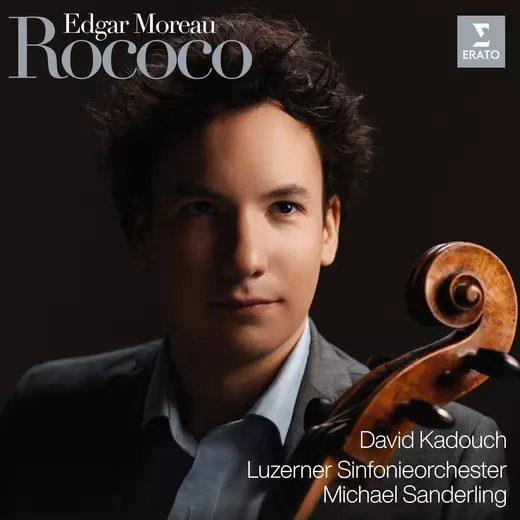
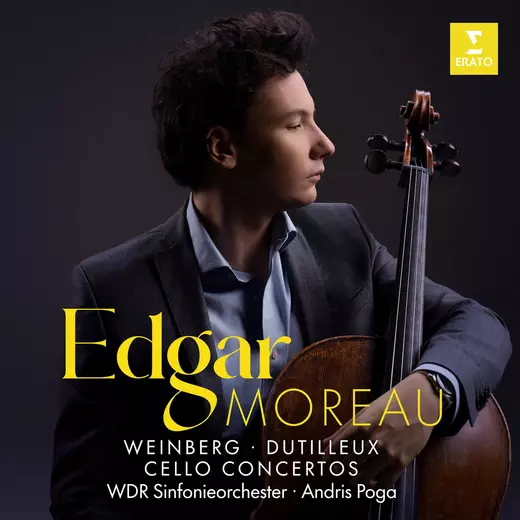
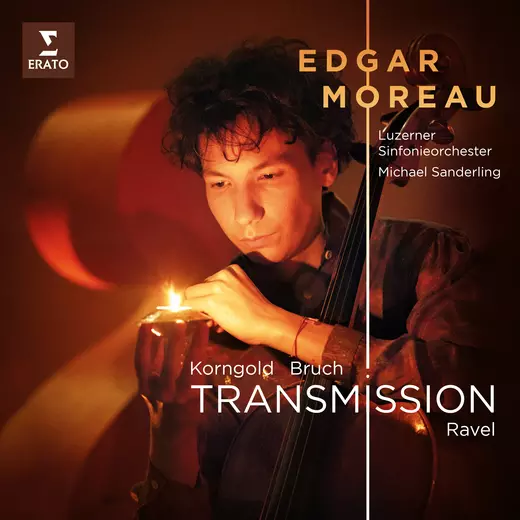
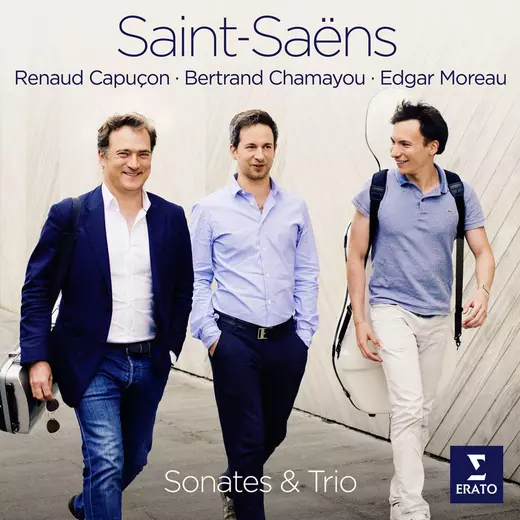
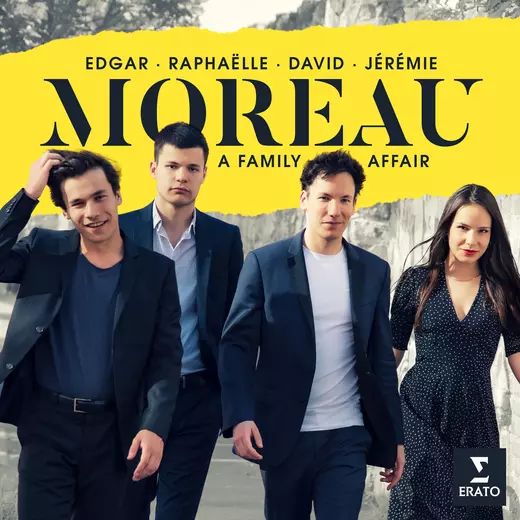
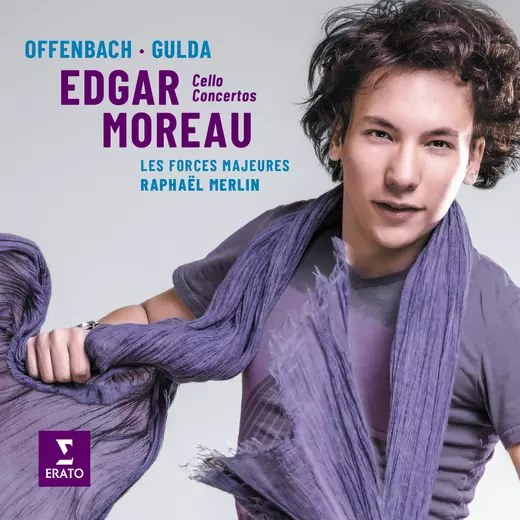
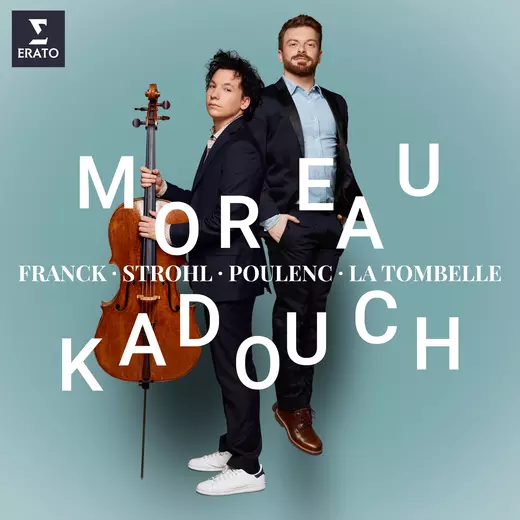
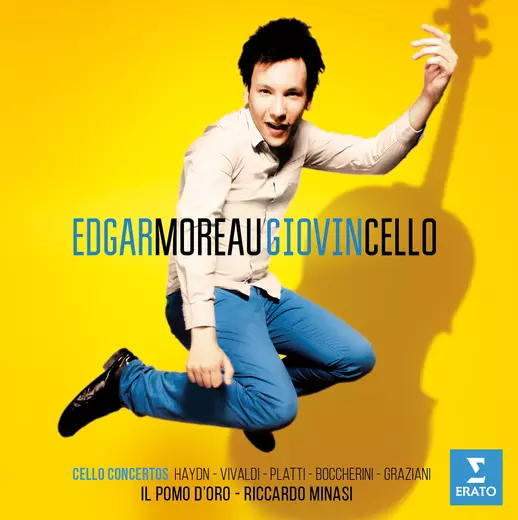
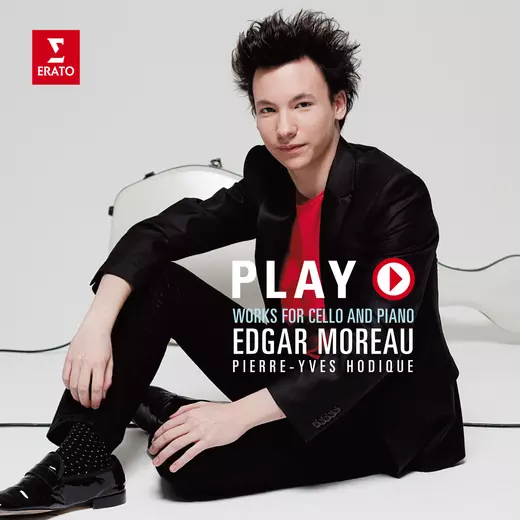
Upcoming Concerts
Friday
Friday
Friday
Sunday
Sunday
